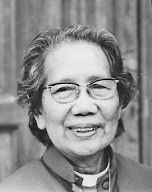Li Tim-Oi
| Florence Li Tim-Oi | |
|---|---|
 |
|
| Born | 5 May 1907 Hong Kong |
| Died | 26 February 1992 (aged 84) Toronto, Ontario, Canada |
| Venerated in | Episcopal Church USA, Anglican Church of Canada |
| Feast | 24 January (Episcopal Church USA); 26 February (Anglican Church of Canada) |
Florence Li Tim-Oi (Chinese: 李添嬡 Cantonese Lei Tim'oi, Mandarin Li Tian'ai; 5 May 1907 in Hong Kong – 26 February 1992 in Toronto) was the first woman to be ordained to the priesthood in the Anglican Communion.
In 1931, Florence Li was present at the ordination of Deaconess Lucy Vincent at St. John's Cathedral in Hong Kong when the preacher had asked for women to give their lives to work for Christian ministry. Being inspired by this, Li would eventually go to Canton Union Theological College to receive her theological education before returning to Hong Kong in 1938. After working for two years in All Saints Church, in Kowloon, helping refugees in Hong Kong who fled mainland China in the midst of the Second Sino-Japanese War, Li was sent by Bishop Ronald Hall to help with refugees in Macau at the Macau Protestant Chapel. Six months into her new post, she returned to Hong Kong to be ordained as a deaconess on 22 May 1941 by Bishop Hall at St. John's Cathedral, where she received her first call.
The Japanese occupation of Hong Kong and of parts of China had made it impossible for Anglican priests to get to neutral Macau, where there was no resident Anglican priest; Li was authorised by Hall and his assistant to give the sacraments to the Anglicans in these extenuating circumstances. Hall explained to the Archbishop of Canterbury at the time, William Temple: "I'm not an advocate for the ordination of women. I am, however, determined that no prejudices should prevent the congregations committed to my care having the sacraments of the Church."
In January 1944, Li travelled through Japanese-occupied territory to meet with Hall in the small town of Xing Xing, as yet unoccupied by the Japanese, where he regularised her administration of the sacraments by ordaining her as a priest. William Temple confided to others his conflicting views but he felt compelled to take a public stand against it. It was to be 30 years before any Anglican church regularised the ordination of women; to avoid further controversy she resigned her licence (though not her priest's orders) after the end of the war.
...
Wikipedia
